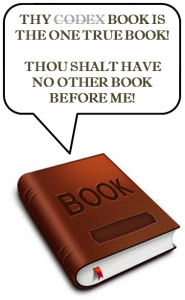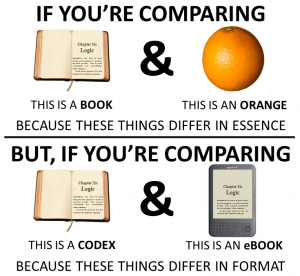 People who want to destroy ideas burn paper books. But, ironically, the love of paper books can become so zealous that it’s just as bad as burning them.
People who want to destroy ideas burn paper books. But, ironically, the love of paper books can become so zealous that it’s just as bad as burning them.
There is a cult-like trend lately in idolizing bound paper books, more properly referred to as codices, as being more “real” than books in any other format.
 Activist poets sing the praises of all parts of a bound paper book that aren’t language and ideas: the texture, the smell, the weight of it. Just give them a blank journal, apparently, and they’d be in ecstasy. Absence of engaging fiction or enlightening information be damned! Just lick the stamped leather cover and be thou satisfied!
Activist poets sing the praises of all parts of a bound paper book that aren’t language and ideas: the texture, the smell, the weight of it. Just give them a blank journal, apparently, and they’d be in ecstasy. Absence of engaging fiction or enlightening information be damned! Just lick the stamped leather cover and be thou satisfied!
There are artists who “honor” books by destroying them or mimicking them Cargo Cult style. Interior designers create absurdly impractical objects from books, like headboards.
Try to imagine the impact of many nights of thrashing and shifting pillows on a row of open-faced books nailed by their spines to the wall. That’s the degree of short-sightedness we’ve come to in regard to reducing paper books to a paper fetish.
LANGUAGE AND IDEAS
I’ll get to why codex fetishism is like book burning in a minute.
First, to be fair, I confess that I also appreciate the sensory aspects of the codex. I own thousands of them. Most of them for their text, but a few simply as works of art, for example an antique book of sermons in Welsh, a language I cannot read.
But, I do not confuse books and codices. The book is the text, and is still a book whether rolled into a lambskin tube, pressed into baked clay, read aloud for a recording, or digitized on a smart phone. The Book of Deuteronomy was a book when it was a scroll, a book when it was bound as a codex, a book when your grandma bought it on CD, and now it’s a book on her Kindle.
All this talk about paper codices as “real” books is essentially the “No True Scotsman” fallacy bumbling its way through the literary world, propagated by people who like to think of themselves as being engaged with language and ideas, and therefore ought to damn well know better. Giving language and ideas the snub so you can spend more time flirting with a stack of wood pulp … well, that tells a its own story about one’s alleged devotion to language and ideas.
So let’s play with language and ideas for a moment. If someone asked you to name “your favorite book,” would you give them a title or point out some paper book without mentioning its title? Would you say something like:
“The Tipping Point by Malcolm Gladwell is my favorite book.”
Or would you say:
“My hardback on the top shelf there. No, not the one with the dust jacket, the one with the hashed cover texture and the rough cut pages. That’s my favorite book.”
See? You do understand the difference, even if you’re not used to applying it. The second response doesn’t really answer the question “what’s your favorite book” because it focuses on the non-book aspects of the codex.
If someone gave you that answer, your obvious follow-up question would be: “Yes, but what book is it?” And by “what book” you’d mean what words were printed onto the codex.
Moby-Dick is a book; my copy of that book is a codex. I can refer to that copy as either a book or a codex, but to lose the distinction between the two is unacceptable.
And I say that not just to be obsessive and pedantic, but because it’s a dangerous error. And, yes, it’s like book burning.
TO DESTROY A CULTURE
The Financial Times recently dropped an oped on book collecting that contained this chilling assertion:
“Words are just one element of a book and not always the best part.”
A more perfect articulation of the confusion between “book” and “codex” can hardly be imagined. It is a common but unfortunate synecdoche—using a part of something to refer to the whole—that dangerously muddles our thinking and thus our discussion about books.
Imagine if someone stumbled over the “all hands on deck” synecdoche and weirdly claimed that only sailors were “real” hands, implying that landlubbers had some entirely different organ growing out of the ends of their arms. It’s a laughably immature way of thinking.
Here’s the creepy part: in the oped quote above, the aspect of the codex that’s elevated to synecdoche (the book printed on it) is precisely the part that’s denigrated and dismissed! It would be like calling “all hands on deck,” telling the assembled crew that only sailors were “real” hands, and then chopping their hands off because “fingers and palms are not always the best part of a hand.”
That’s the level of insanity our discussion of books has reached in its downward spiral of confusion.
The book is the text, the physical object is a codex, and the fact that most people don’t generally understand the distinction doesn’t mean there is no distinction or that the distinction isn’t important. Extolling the virtues of the non-book parts of a codex is not how you honor books. It’s how you reduce them to meaninglessness.
To paraphrase Bradbury: You don’t have to burn books to destroy a culture, just get people to focus on the parts they don’t read.
Trying to nurture a culture of literature and ideas while devaluing books is like trying to sail a ship with a handless crew.

